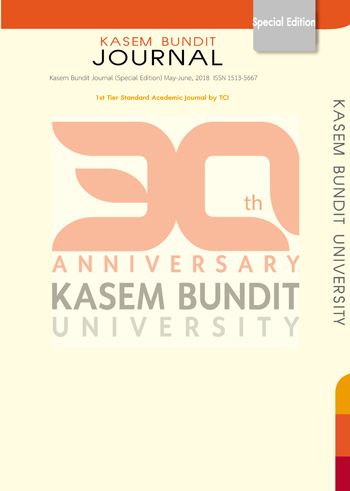Exploratory Sequential Mixed Method towards Repurchase Intention of Second-Hand Toys for Collecting from Annpatinya Thammatiwat’s Facebook
Keywords:
Customer Experience, Trust, Repurchase Intention, FacebookAbstract
This study focuses on the relationship between customers experience, trust, and repurchase intention of Annpatinya Thammatiwat’s Facebook. Three sub-variables of customer experiences comprise store offering, customer service, and fulfillment reliability. The questionnaire was 100% distributed online. Purposive and convenience sampling methods were applied. Approximately 20% of population from Annpatinya Thammatiwat’s Facebook visitors responded as our sample. This study applied mixed method both exploratory and explanatory sequential design. Also, simple linear regression and multiple linear regression (MLR) were applied to test all hypotheses.
References
Chen, C. (2006). “Identifying significant factors influencing consumer trust in an online travel site”. Information Technology & Tourism. Vol. 8.(Issue 3-4.) : 197–214.
Chiu, C.-M., Lin, H.-Y., Sun,S.-Y., & Hsu, M.-H. (2009). “Understanding customers' loyalty intentions toward online shopping: Anintegration of technology acceptance model and fairness theory”. Behaviour & Information Technology. Vol. 28. (Issue 4.) : 347–360.
Dabholkar, P.A.; Sheng, X. (2009): “The role of perceived control and gender in consumer reactions to download delays”. Journal of Business Research, Vol. 62. : 756–760.
Erciş, A., Ünal, S., Candan, F. B., & Yıldırım, H. (2012). “The effect of brand satisfaction,trust and brand commitment on loyalty and repurchase intentions”. Procedia-Social and Behavioral Sciences. Vol.58, 1395-1404.
Ernst, C., & Martin, A. (2007). “Experience counts: Learning lessons from key events”. Leadership inaction. Vol. 26. (Issue 6) : 3–7.
Gefen, D., Benbasat, I., and Pavlou, P.A. 2008. "A Research Agenda for Trust in Online Environments,"Journal of Management Information Systems Vol. 24. : 275-286.
Li, H. Q., & Hong, J. H. (2013). “Factors influencing consumers online repurchasing behavior”. A review and research agenda. I-Business. Vol. 5. (Issue 4.) : 161-166.
[9] Patrick McCole, (2002) “The role of trust for electronic commerce in services”. International Journal of Contemporary Hospitality Management. Vol. 14. (Issue 2.) : 81-87.
[10] McCole, P. and Palmer, A. (2001). “A critical evaluation of the role of trust in direct marketing over the internet”. World Marketing Congress, University of Cardiff, Wales.
[11] N. Johanna Nilsson, O. Wall. (2017).Online customer experience, satisfaction and repurchase intention for online clothing retailing. University of Gothenburg, School of Business. Economics and Law. Gothenburg, Sweden.
]Nunnally, J. C. (1978). Psychometric theory (2nd ed.). New York, NY: McGraw-Hill.
Spreng, R. A., Mackenzie, S. B., and Olshavsky, R. W. (1996). “A reexamination of the determinants of consumer satisfaction”. Journal of Marketing. Vol. 60. (Issue 3.): 15-32.
Yu‐Hui Fang, Chao‐Min Chiu, Eric T.G. Wang, (2011) "Understanding customers' satisfactionand repurchase intentions”. An integration of IS success model, trust, and justice", Internet Research. Vol. 21. (Issue: 4.) : 479-503.
Downloads
Published
How to Cite
Issue
Section
License
ทัศนคติ ความคิดเห็นใด ๆ ที่ปรากฏในวารสารเกษมบัณฑิตฉบับนี้เป็นของผู้เขียน โดยเฉพาะ มหาวิทยาลัยเกษมบัณฑิตและบรรณาธิการ ไม่จำเป็นต้องมีความเห็นพ้องด้วย







